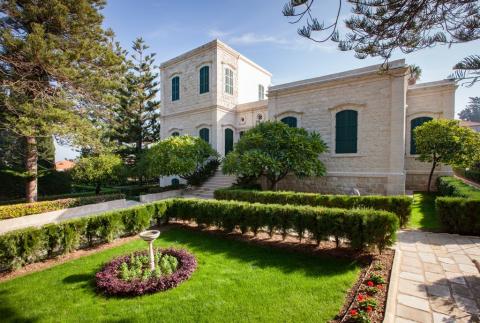‘Life at ‘Akka and Haifa in the reign of ‘Abdu’l-Hamid was full of tension and danger. Palestine was a tinder box. Tribes fought each other. Crime was rampant. The streets of ‘Akka were too narrow for bandits to roam free, but in Haifa they were a constant threat. Shots were heard every night but murderers were never apprehended. Whenever ‘Abdu’l-Bahá was in Haifa, the Bahá’ís feared for His life and watched His movements. Frequently He went to visit the poor alone at night, refusing an escort or even a lantern-carrier. However, at a distance a Bahá’í would secretly watch His progress to the very door of His house. ‘One night it was Yunis Khan’s turn to follow the Master. ‘Abdu’l-Bahá was returning home past midnight when in the dark three shots rang out from a side street. Having become inured to the sound of gunfire, Yunis Khan paid no attention to the first shot. The flash of the second shot sent him running toward the Master. He had reached the intersection when the third shot was fired and he saw two men running away. He was now no more than a step behind the Master. ‘Abdu’l-Bahá walked on without changing His pace or turning His head. His tread was firm and dignified. He had paid no attention to what had occurred but quietly murmured prayers as He walked. At the gate of His house He acknowledged Yunis Khan’s presence, turning to him and bidding him goodbye (‘fi amani’llah’ under God’s protection.)’
Protection
In the spring of 1918, I was much startled and deeply disturbed by a telephone message: "‘Abdu’l-Bahá in serious danger. Take immediate action." It came from an authoritative source. There was not a moment to be lost. Every available power must be brought to bear to save the Master. I went at once to Lord Lamington. His sympathetic regard for ‘Abdu’l-Bahá, his understanding of the ramifications and "red tape" necessary for "immediate action" were of priceless value. A letter was immediately written to the Foreign Office explaining the importance of ‘Abdu’l-Bahá’s position, His work for true peace, and for the spiritual welfare of many thousands of people. Through the influence of Lord Lamington, and his prompt help, the letter, with its alarming news, was at once put into the hands of Lord Balfour. That very evening a cable was sent to General Allenby with these instructions, "Extend every protection and consideration to ‘Abdu’l-Bahá, His family and His friends, when the British march on Haifa." So a terrible tragedy was averted, by the promptness and understanding of Lord Lamington and the power of Lord Balfour, his colleagues in the Cabinet here in London, and by the devotion, efficiency, and promptitude of Major Tudor-Pole at the Turkish end, for Haifa was still in the hands of the Turks.
The Turks had been so aroused by the enemies of the Master that they had threatened to crucify Him, and all His family, on Mount Carmel. When General Allenby took Haifa, several days before it was believed possible for him to do so, he sent a cablegram to London which caused everybody to wonder, and especially filled the hearts of the Bahá’ís in all the world with deep gratitude to the Almighty Protector. The cable of General Allenby was as follows: "Have to-day taken Palestine. Notify the world that ‘Abdu’l-Bahá is safe."
One day in September 1912 ‘Abdu’l-Bahá left Chicago for Kenosha. The party was scheduled to change trains en route but, to the chagrin of His friends, He missed His connection. However, He simply told them ‘. . . it matters not. There is a wisdom in it.’ They caught the next train, only to find en route that the train they had missed had been badly damaged in a collision with another train and passengers had been wounded. The Master was fully aware of the protection that had been theirs and told the friends that when He was departing from Alexandria on His way to America, the suggestion had been made that He should take the newly launched Titanic from London: it went down on that voyage. He affirmed that He had been guided to come by the direct route.
